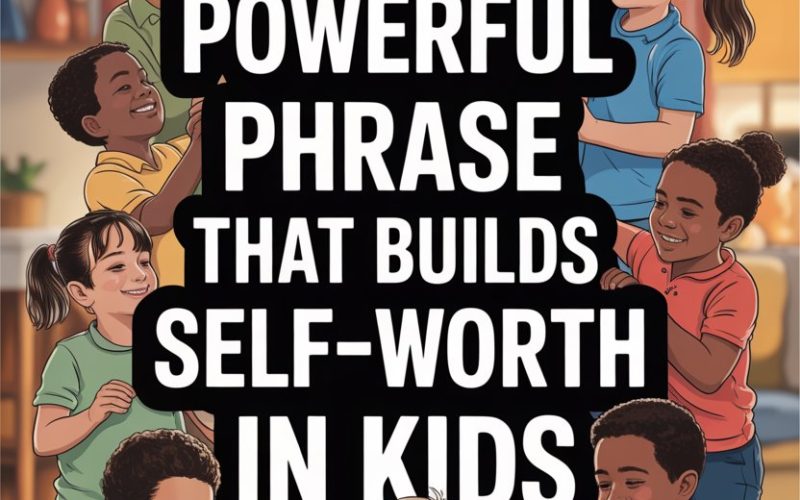Ever wish you had a secret phrase that could make your child stand taller, inside and out? Something simple, quick, but almost magically impactful—like the “abracadabra” of parenting?
Good news: It exists. And no, it’s not “Clean your room.” (Though wouldn’t that be nice?)
Let’s get straight to the phrase that works wonders, and why it belongs in your daily parenting toolkit.
The Phrase: I Love How Hard You Tried
This one’s for every child who’s ever crumpled up a maths sheet, fumbled a football, or wrestled with shoelaces. “I love how hard you tried.”
Not “You’re the smartest!”
Not “You’re the best player!”
Not even “You won!”
Just: “I love how hard you tried.”
It sounds almost laughably simple, doesn’t it? But research shows that praising effort, not just achievement, does more than fill the air with warm fuzzies—it rewires a child’s brain to value growth, resilience, and, yes, self-worth (Carol Dweck, HBR).
Why This Phrase Packs Such a Punch
Let’s peek behind the curtain. What happens when you say, “You’re so clever!” versus, “I love how hard you tried”?
Kids praised for their natural gifts start to panic when things get tricky. If being “smart” is the end-all, any wobble feels like disaster. Cue stress, avoidance, and the sudden urge to claim “the dog ate my maths sheet.”
On the other hand, kids who hear their effort is loved and noticed? They’re more likely to keep going, even when the going gets rough.
Instead of thinking “I’m not smart enough,” they think, “If I keep at it, I’ll get there.” Psychologists call this a growth mindset, and it’s a lifelong gift.
The Real Self-Worth Booster
Self-worth isn’t built on a pile of gold stars. It’s not the trophy cabinet or the spelling test scores.
True self-worth comes from believing you have value, even when the world isn’t applauding.
When you say, “I love how hard you tried,” you’re telling your child:
Your effort matters.
Your process matters.
You matter, even on tough days.
This unconditional support? It’s the launching pad for confidence, curiosity, and that stubborn, wonderful grit every parent secretly hopes their child will have.
What the Science Crowd Says
If you’re thinking, “This all sounds very feel-good, but does it really work?”—fair question.
In one famous study, psychologist Carol Dweck split groups of school kids and praised one set for intelligence, the other for effort.
The effort-praised kids chose harder tasks, stuck with problems longer, and bounced back from mistakes like little rubber balls.
The intelligence-praised kids? They wilted when faced with challenges and became less willing to try difficult things. Ouch.
Other researchers have found similar results across cultures, age groups, and even in sports (Journal on Child Development). Telling kids you notice their struggle, not just their success, changes their trajectory.
Making the Phrase Work in Real Life
Before you imagine yourself becoming a praise robot—“I love how hard you tried at eating broccoli! I love how hard you tried at not yelling at your brother!”—breathe.
It’s not about slapping the phrase on every moment. It’s about noticing the genuine effort.
Try these:
- When your child brings home a painting that’s half muddy footprints, half something resembling a cat: “I love how hard you tried to use those new paints.”
- When maths homework ends in tears but they didn’t give up: “I love how hard you tried, even when it was tough.”
- When the football match is lost but they kept running: “I loved how hard you tried to get the ball back.”
Kids are surprisingly good at sniffing out fake praise. Keep it honest. Keep it specific.
When Effort Isn’t the Only Thing That Matters
Is it all about effort? Not quite. Sometimes, kids need guidance, not just a pat on the back for slogging away.
If you see your child stuck, offer help: “I love how hard you tried to read that word. Want to sound it out together?” Now you’re building connection, not just confidence.
If your child slacks off and expects praise anyway, don’t be afraid to nudge: “Did you put in your best try, mate?”
Kids respect the honesty and soon learn that self-worth comes from genuine effort, not going through the motions.
For Parents Who Worry About ‘Overpraising’
You’ve heard the warnings—don’t raise a generation of trophy-hunters who expect a parade for existing. Fair enough.
The beauty of “I love how hard you tried” is that it’s grounded in reality. You’re not inventing achievements out of thin air. You’re not pretending every scribble belongs in the Louvre.
This phrase celebrates the journey, not just the destination, and it encourages your child to take pride in their own process.
If you’re worried you might be “overdoing it,” check in with your gut. Are you being genuine? Are you praising process, not just outcome? You’re on the right track.
Shifting the DINNER TABLE Conversation
Instead of the classic, “How was school?”—which often gets a monosyllabic “Fine”—try:
“What’s something you tried hard at today?”
Or, “Was there anything really tricky you stuck with, even if it didn’t go to plan?”
You might get stories about playground politics, spelling bee disasters, or even attempts at the world’s slowest handstand. The important thing: kids start noticing, and valuing, their own grit.
The Magic Works for Grown-Ups Too
Here’s the kicker: try this phrase on yourself.
“I love how hard I tried to make dinner tonight, even if it’s a bit… crispy.”
“I love how hard I tried to be patient when the toddler painted the dog again.”
Kids notice how we treat ourselves. When you value your own effort, you model self-compassion—one of the greatest gifts a parent can give.
And yes, the dog probably appreciates it too.
What If My Child Refuses to Try?
Some days, kids are more Eeyore than Tigger. The world feels hard, and effort seems pointless.
This is when your words matter most.
Acknowledge their feelings: “I can see you’re frustrated. I love how hard you tried anyway.”
Offer to help break down the task: “Let’s try together for five minutes.”
Show that struggling is normal: “I had to try heaps of times before I could ride my bike too.”
When effort feels safe, kids are braver next time. And the time after that.
Goodbye, Comparison Trap
It’s tempting to compare. “Look how well your sister did,” or “Your friend got full marks, why not you?” These comments chip away at self-worth faster than you can say “sibling rivalry.”
Focusing on your own child’s effort—regardless of others—builds internal confidence. Kids learn to measure themselves against their own progress, not the neighbour’s kid or the school leaderboard.
Side effect: much happier family mealtimes.
Building a Self-Worth Ritual
Want to lock in this new habit? Make “I love how hard you tried” part of your daily routine.
Bedtime is golden. When heads hit pillows and the day’s bravado fades, a quiet, specific mention of effort (“I loved how hard you tried to apologise to your friend today”) leaves a lasting impression.
Get siblings involved. Encourage them to spot effort in each other, not just results. It’s a game-changer for sibling squabbles.
Even a note popped into a lunchbox—“I love how hard you tried at your spelling test”—can make a long school day feel a little friendlier.
When the Phrase Grows Up
“I love how hard you tried” won’t always sound exactly right. At some point, your 16-year-old might groan if you say it after a driving lesson.
But the message endures. Over time, it can mature into:
“I admire your persistence.”
“I noticed you kept going even after a setback.”
“I’m proud of the effort you put in, not just the result.”
The language grows with your child, but the message stays the same. You are loved for who you are and how you try—not just trophies or test scores.
Putting the Magic Into Practice
Kids don’t need a perfect parent. No one expects you to have sage wisdom ready for every scraped knee or classroom drama.
But if you make “I love how hard you tried” a go-to phrase in your parenting repertoire, you’re planting the seeds for resilience, courage, and robust self-worth.
Even on days when your effort is just about remembering to pack snacks (again), you’re showing your child that trying matters.
And that is some serious parenting magic.




